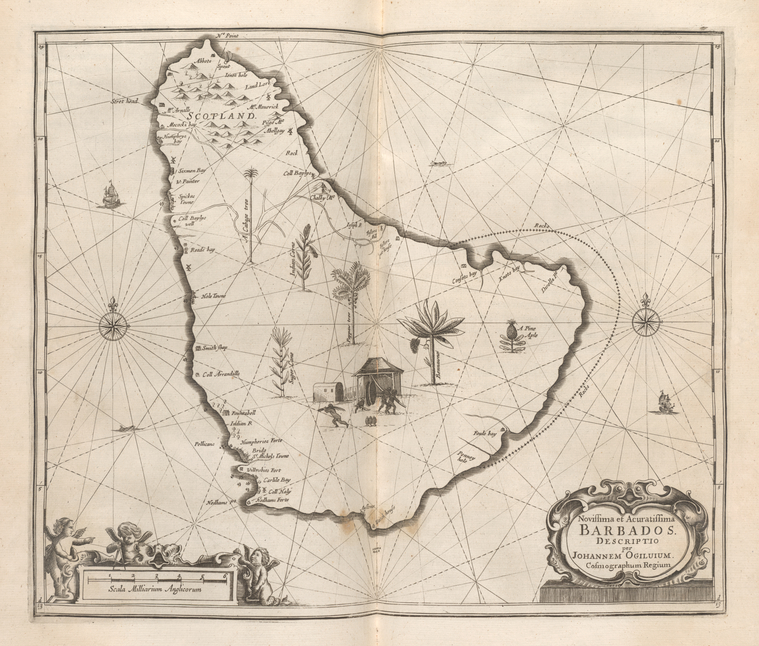The Ticketless Traveler
The Ticketless Traveler: Barbados, Bajans, and Burns
Crystal clear, turquoise water. White powdery sand. Intoxicating rum punch.
Second degree sunburn.
What do all these things have in common? Just a smattering of experiences I recently acquired during a six-day trip to Barbados.
The Serrano ham-shaped island, about twice the size of Washington, D.C., is home to a population of roughly 280,000 people, making it one of the more populous Caribbean islands. Tourism plays a prominent role in the economy, as does manufacturing, but the nation still holds to the legacy of the sugar cane harvest and molasses production. I bought along with me to read on this trip A History of Barbados: From Amerindian Settlement to Nation-State by Hilary Beckles, which covers the political history of Barbados including earliest settlements, colonialism, slavery, independence from the UK (in 1966), and modern parliamentary government.
I saw much of the country from the windows of local buses, and spent a fair amount of time waiting at bus stations for arrivals and departures. I was charmed by the names of destinations such as "Fairy Valley" and "Pie Corner," and impressed by the orderly manner in which people lined up to board the vehicles, a far cry from the push n' shove 'em of the MTA.
When I wasn't riding buses and gawking at gorgeous landscape, I was lying prone on one or another of the gorgeous beaches that ring the Caribbean and Atlantic coastlines of Barbados. Despite the claims of my SPF 50 sunscreen, I managed to get a scorching sunburn on the entirety of my legs. The burn got me thinking about that hole in the ozone layer, so I placed a hold on the environmental treatise The End of Nature by Bill McKibben when I returned from my trip.
The interior of Barbados is hilly and covered in forested limestone, rich in flora and fauna. On a trip to the Barbados Wildlife Reserve I encountered peacocks, a bearded fig tree, tortoises, children running after and smacking the shells of tortoises, and a troop of green monkeys. One monkey cleverly divulged the presence of a banana, nestled in my friend's bag, with a swift and stealthy movement. You need not travel anywhere in particular on the island to hear the chorus of whistling tree frogs, which begin their nightly serenade at dusk until dawn. For a treat for the eyes, check out 300 Frogs: A Visual Reference to Frogs and Toads From Around the World by Chris Mattison.
Sightseeing and beachcombing are great, but no vacation is complete without copious amounts of food and drink. Fishcakes were abundant (actually more like fried fish spheres, but that doesn't roll off the tongue quite as nicely), as was to-die-for macaroni pie, and rum, the national spirit, appearing in rum punches and frothy daquiris. To explore more of the cuisine of the Caribbean, check out Caribbean Cookbook: A Lifetime of Recipes by Rita G. Springer.
We happened to be visiting Barbados just before thee annual Crop Over celebration, which marks the end of the sugar cane harvest with Carnival festivities. In conjunction with Crop Over, we caught the Pic-O-De-Crop calypso contest at Bridgetown's stately Kensington Oval — the cricket stadium. This year's monarch was a contestant named Popsicle. Much of calypso music has a tradition of social commentary, dressed up in outlandish performance. Check out some classic calypso here.
As a librarian, of course I had to stop by the public library in Bridgetown, the capital of Barbados. I was charmed to see a bona fide card catalog still in use (alongside a bank of Internet PCs, of course). What made this library special was a thorough collection of West Indian literature, both fiction and non-fiction. One title that fascinated me was a travel book called A Black Woman's Odyssey Through Russia and Jamaica: A Narrative of the Life and Travels of Ms. Nancy Prince. Ms. Prince was a free African-American woman living in Massachusettes in the decades before the Civil War. Working for abolitionist and feminist causes, she eventually moved to czarist Russia with her husband, Nero Prince, who came to Russia as a sailor and served in the Imperial Court. After returning to America a widow ten years later, Nancy Prince then set off to Jamaica as a missionary to work with newly emancipated Jamaicans. A travel odyssey indeed.
Read E-Books with SimplyE
 With your library card, it's easier than ever to choose from more than 300,000 e-books on SimplyE, The New York Public Library's free e-reader app. Gain access to digital resources for all ages, including e-books, audiobooks, databases, and more.
With your library card, it's easier than ever to choose from more than 300,000 e-books on SimplyE, The New York Public Library's free e-reader app. Gain access to digital resources for all ages, including e-books, audiobooks, databases, and more.
If you don’t have an NYPL library card, New York State residents can apply for a digital card online or through SimplyE (available on the App Store or Google Play).
Need more help? Read our guide to using SimplyE.
